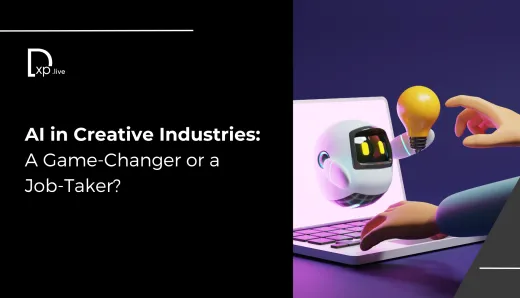Mapping the Journey to a Data-Driven, AI-Powered Enterprise by 2030

The race to become an AI-powered enterprise is on, and it’s definitely reshaping how businesses think about data. We all know the game-changing potential of generative AI (Gen AI) and smarter analytics. The excitement surrounding AI’s potential—spanning from improved operational efficiency to groundbreaking innovations like personalized medicine—has compelled companies to rethink their business strategies from the ground up.
Amidst this enthusiasm, data remains at the core of these transformations, acting as the lifeblood of any AI-driven initiative.
Data Ubiquity: The Foundation of the AI Enterprise
By 2030, the concept of “data ubiquity” will become more than a buzzword—it will be a reality. Companies will rely on real-time, precise data embedded into every layer of their systems, processes, and decision-making channels.
McKinsey points out that data will no longer be a resource accessed manually but will become an integral part of the workflows that drive automated actions. This shift will empower companies to respond faster, act smarter, and make decisions that are grounded in detailed data analysis.
Let’s consider a scenario:
- Quantum-sensing technologies will generate real-time performance data, which AI can analyze to suggest proactive software updates.
- Digital twins, supported by historical customer data, will enable AI agents to simulate products and services before they reach consumers.
McKinsey noted that many organizations still struggle with understanding what data they need and how it can be harnessed effectively.
As companies march toward 2030, leaders must adopt a “data-first” mindset to ensure that data not only supports but actively drives better outcomes for users. This will also improve the user experience by enabling companies to deliver more personalized, relevant, and timely solutions to their customers.
The Competitive Edge of AI
The widespread adoption of generative AI has led to a surge in innovation, but many companies are finding themselves on a level playing field. In McKinsey’s view, while companies are quick to adopt new tools, true competitive advantage—known as “unlocking alpha”—comes from how well an organization can leverage proprietary data to customize AI models for unique use cases. In essence, the value of AI doesn't just lie in the technology but in how it's applied to create differentiation.
To unlock alpha, companies should:
- Customize AI models using proprietary datasets that are tailored to their unique needs.
- Integrate AI capabilities across multiple business functions to create end-to-end systems that deliver better insights and outcomes.
- Focus on a few high-value data products, as McKinsey highlighted, since the majority of business value often comes from a small subset of well-managed, highly consumable data products.
By integrating AI and data effectively, C-suite leaders can ensure their organizations remain competitive while offering more intuitive and relevant user experiences that cater to the individual needs of customers.
Capability Pathways: From Pilots to Scalable Solutions
AI adoption is proliferating across industries, and one of the biggest challenges companies face is moving beyond disconnected use cases and pilots—what McKinsey refers to as “pilot purgatory.” While individual departments may experiment with AI, scaling these technologies across the enterprise requires an architecture that supports sustainable, long-term deployment.
To achieve this scalability, leaders should focus on:
- Building “capability pathways” that bundle technology components into scalable systems that support multiple use cases.
- Making critical decisions on data architecture, whether through centralized, decentralized, or federated models.
These decisions not only ensure that AI projects can scale but also support a more seamless user experience by enabling organizations to react in real time and deliver faster, more consistent solutions to their users.
Unstructured Data: The Next Frontier
Currently, structured data—think customer records or product specifications—counts for only a fraction of the data most companies handle. The vast majority, up to 90%, consists of unstructured data such as images, videos, emails, and social media posts.
McKinsey states, “Generative AI is opening the door to harnessing this unstructured data," offering enormous potential for companies that know how to use it effectively.
The challenge for executives is twofold:
- Unstructured data requires more complex processing, cleansing, and tagging to make it usable.
- Managing the influx of unstructured data, which is expected to increase tenfold by 2030, will require significant investments in AI and machine learning technologies.
Despite the challenges, companies that invest in mastering unstructured data will be better positioned to deliver highly personalized user experiences. AI-driven systems could analyze customer reviews and purchasing habits to create personalized offers in real time, enhancing customer satisfaction and loyalty.
Leadership and Talent: Building the Data-Driven Team
No AI or data strategy can succeed without the right leadership and talent in place. McKinsey points out that many chief data officers struggle to integrate data into their company’s business models, leading to disjointed efforts. The key to overcoming this is finding leaders who possess a mix of governance, engineering, and business acumen.
- Governance leaders ensure data compliance and manage risks like cyber threats.
- Engineering leaders focus on building scalable, efficient systems.
- Business value leaders bridge the gap between data capabilities and revenue generation.
The rise of AI and automation will reshape the talent pool itself, requiring companies to rethink their hiring and training processes. Leaders must work with HR to develop programs that teach employees new skills, such as prompt engineering, DataOps, and AI ethics. By cultivating the right mix of skills, companies can empower their teams to create smarter, more user-centric solutions that drive business growth.
Data and AI as the Foundation of Future Success
Data and AI will be the driving forces behind business transformation as the organizations move toward 2030.
McKinsey: Success requires more than just adopting the latest tools—it’s about building a culture that prioritizes data-driven decision-making and equips employees with the skills they need to thrive in a rapidly evolving landscape.
The journey to a fully data-powered enterprise may be complex, but the right strategy is the KEY. For tech leaders, the challenge will be to align data strategies with user experience priorities. By focusing on personalized, intuitive solutions that cater to the needs of their customers, leaders can ensure their organizations are not only data-driven but also user-centric, delivering value in ways that resonate with today’s increasingly demanding consumer base.
Join the conversation! Stay ahead with our latest opinions on all the captivating topics!!




